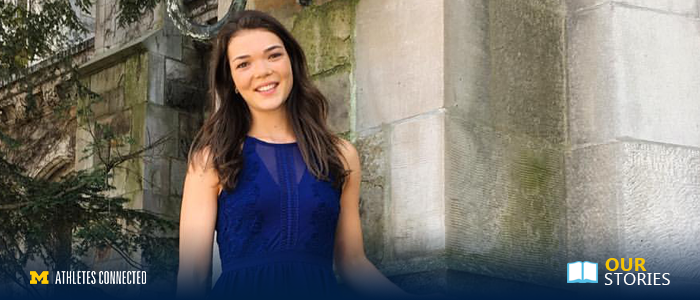Last Updated on September 8, 2017 by

The Athletes Connected program continues to share stories from current and past student-athletes, coaches and staff members about various subjects related to mental well being and sports. Beginning this fall, we will have first-person posts in this space. The first of many original stories we will share this year is written by Traci Carson, a former Michigan rower and current PhD student in the U-M School of Public Health.
By Traci Carson
I had never been a “quitter.” This label was tough to swallow, but I knew there had to be a difference between quitting and choosing to making a change when life felt out of control.
As a transfer student, I moved to Ann Arbor the summer before my sophomore year and joined the women’s rowing team. I thought I had found my perfect fit. This team and culture were exactly what I wanted to be a part of; I was surrounded by women who were striving to be the leaders and best, both on and off the field. On the surface, this was a dream come true. Friends and family were so proud, and the positive attention I received as a member of the Michigan athletics community, was truly special. Despite this, something was wrong. I couldn’t identify or name it, but I was losing control.

Fast forward to junior year, I knew that I was unhappy, stressed out, and chronically exhausted, so I made the decision to leave the team. I told myself that everything would “automatically get better” if I removed myself from the team and the pressures of college athletics. While I came up with several reasons why this was the right decision, none of them acknowledged the true problem.
At that time in my life, I was running on empty and living life on autopilot; I was completely out of touch with my mind and body. In retrospect, it scares me to think about the damage I was doing to my mental and physical health, and today I can finally acknowledge and name what I was experiencing.
Being able to name what I was experiencing has been powerful in my journey to recovery and self-improvement and allowed me to accept that I needed help. I encourage anyone reading this reflect how you are feeling right now and what you would tell a friend if you knew they felt this way. Would you encourage that friend ask for help?

I talk about my experiences in the present tense, because I am a work in progress. I found that it became much easier to work on my challenges when I could finally name them.
I have anxiety
Early in college, I didn’t know what anxiety was. I had heard about depression, but I knew nothing about the signs and symptoms of other mental health disorders. I had convinced myself that extreme stress, inability to sleep, and restrictive eating was all part of being an athlete. Today, I can confidently acknowledge that I have anxiety, and I am learning how to thrive and cope with this challenge.
I have disordered eating
My relationship with food has been complicated. From a young age, I was very insecure about my strong legs, and this sparked my interest in learning as much as I could about nutrition and how to control my diet. At the age of twelve I began counting calories and memorizing nutrition labels. This restrictive pattern continued into college, all while training two to three hours a day.
The day I cried in the team nutritionists’ office, when she suggested that I add milk to my oatmeal, I began to realize that food was controlling me. Today, with the help of a nutritionist, I am working on improving my relationship with food and fueling my body in a way it deserves.
I am dependent on exercise 
As a college athlete, I truly enjoyed training. I loved early mornings in the weight room, that was my time to stand out. Despite my drive to be a great athlete, I reached a point in college when my body image became more important than my physical performance.
I craved the feeling of complete exhaustion, which I reached fairly quickly due to my poor recovery and nutrition habits. My self-worth was completely wrapped up my identity as an athlete. I still find so much satisfaction in exercise and crave it daily, but I am working on finding the best balance for my body and mind.
Thinking back to my college years, I realize that I shoved away my feelings and fears, so that I could be this person I thought I “should” be. I lived with perfect structure, leaving no room for flexibility, intuitive decision making, or spontaneous adventure. I trained myself not to feel.
The culture of college athletics is both a beautiful and intense space. Athletics taught me incredible lessons about leadership and community, while at the same time, taking a notable toll on my mental and physical health.
Where am I now? Trying to find balance in my life. I go to weekly therapy sessions and meet regularly with a nutritionist. I found yoga and build in time each week to let my mind and body rest. I have dedicated this past summer to working on myself and embracing the present.
I hope that one day I can speak about my experiences in the past tense, but in the meantime, I will continue to share my story in the hopes that I encourage someone else to do the same.
Resources
Athletes Connected Get Support Page
Michigan Medicine Comprehensive Eating Disorders Program
U-M Counseling and Psychological Services (CAPS)
Campus Mind Works – U-M website supporting student mental health


